#he provides her primary emotional investment in the police force
Explore tagged Tumblr posts
Text
If I could get past my paralyzing inability to finish anything I could write Nora & Faith fucking/fighting/doing something awful to that creepy dissociative ballad Drunk AF but. Brain bad :(
#smthn like. Burke is such a grounding (derogatory) force in Nora’s life right?#he provides her primary emotional investment in the police force#generally distracts her from That Drank#and Faith kills him!!#and that’s why the bunker needs to go. that’s why the angels who are completely beyond cogent decision making have to go with it#but like. the police force was never a good force in the first place regardless of Burke’s investment in it;#used in the narrative of the cult as the antichrist & external to that functionally neglecting that predatory influence wholesale#exemplified by no one better than Faith. so. shrug.#Nora hates her Nora wants her dead & buried.#Nora can’t put her in the mental trash can that John Jacob etc went into.#Nora sees her in the rafters. she follows her like a ghost.#Deputy Nora Kingston#faith seed#marshall burke#cameron burke#I guess
2 notes
·
View notes
Photo

Parentification of a child happens when the parent and child roles are reversed. This can take the form of instrumental parentification, where the child performs physical tasks that should be the parent’s responsibility. This can be things like paying bills, performing chores that are not age appropriate/undertaking all the chores in the household, or being the primary caregiver for younger siblings. These responsibilities mean there is no time to be a child or have any aspirations. Many children who are the victim of instrumental parentification are deprived of opportunities to have a better life, such as education.
-- “I Was a Parentified Daughter”
in the beginning, drama light is exactly the same as manga light. we see him as a young boy, brilliant, planning on becoming a member of the NPA just like his father.

[photo 1: a dimly lit screenshot of light yagami as a child talking into a yellow toy walkie-talkie. his dark hair is a bit past his ears. he is wearing a red, white and blue plaid shirt. light is saying, "I caught sight of the culprit!" photo 2: soichiro yagami is crouching on the stairs. the lighting is shining from behind him, and we can see his face through slots in the railing. he is also talking into a walkie-talkie, saying "Got it, Light. Storm the place."]

[photo 3: soichiro again talking into a walkie-talkie. he is no longer on the stairs, but it's difficult to tell where he is inside the house. he is wearing a green, yellow, and white striped polo(?) and saying, "You can't join the police if you're afraid." photo 4: light as a child still, brandishing a plastic black and orange toy pistol. he's saying, "Roger, I'm going in." into the walkie-talkie.]
-- Episode 1
the light we see in the series proper, however, is not the same as manga light. he’s gentle, and sensitive, and anxious. he suffers from panic attack after panic attack. there’s a misconception that he’s the “dumb” light, which frankly isn’t true.
the difference between them is the death of Light’s mother when he was young. his father was working on a case and refused to come to his ailing wife’s bedside, presumably assuming that she would be fine, so light and sayu were alone with sachiko as she passed.
Policeman: We got a call from the hospital. Your wife’s in critical condition. Soichiro: No, Otoharada takes priority. I’ll go to the hospital later.
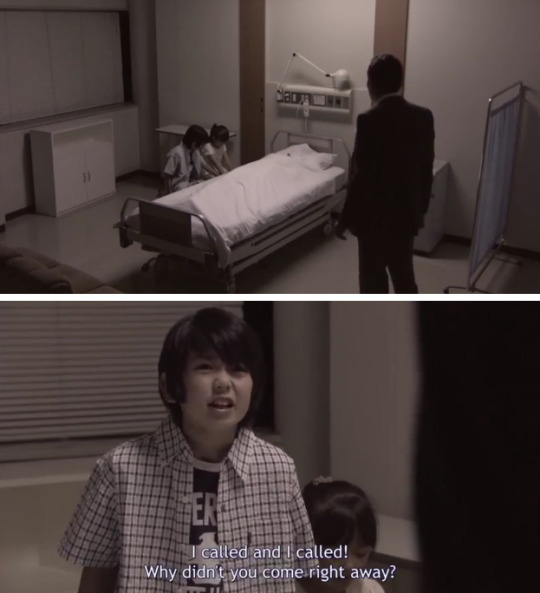
[photo 1: a nearly empty hospital room. there are no decorations or well-wishing gifts or cards in the space, just a seemingly bare white cabinet against the wall, a matching nightstand beside the hospital bed, and a pale blue privacy screen off to the side. there is a body (sachiko yagami) under the white hospital sheets; her face is covered with a napkin. child light and his sister, still a toddler, are sitting beside her bed, distraught. soichiro yagami has just entered the room and is looking at the scene with his back facing the camera. photo 2: child light, wearing an unbuttoned black and white plaid short-sleeve flannel over a graphic tee. he is shouting at his father, saying, "I called and I called! Why didn't you come right away?"]
-- Episode 1
it clearly traumatized light, if not sayu. she later says that he and his father have been distant ever since then.
Sayu: He’s acting really weird. Soichiro: How so? Sayu: I mean, he never worries about you. It’s creepy. Soichiro: That’s not creepy. Sayu: Yeah, it is! You know he’s been cold to you ever since the thing with mom.
-- Episode 2
as a result of this, drama light grew up very different from manga light--manga light is likely upper middle class, given that he can afford to toss away expensive mini tv sets, whereas we can see the yagami family in the drama struggling financially. light gets on sayu about not using electricity to save money:
Light [about the television]: If you’re not gonna watch it, turn it off. You’re running up our electricity bill.
-- Episode 1
drama light simply does not get the same opportunities as manga light. he goes to a just-decent economics college instead of working towards the prestige of To-Oh simply because he cannot afford it.
Light’s boss: Yagami-kun, you want a public sector job? Light: Well, job security. There’s no risk of them running out of business. Light’s boss: Don’t you have any ambition? Like hitting it big and getting rich? Light: Once you get greedy, there’s no end.
-- Episode 1
but also because of the second change, which is that his father's emotional absence and distance when light needed him most (both as and after his mother’s death) resulted in light shunning his father's line of work entirely; while he still grows up with his father's morals and sense of justice, he has no desire anymore to act upon them.
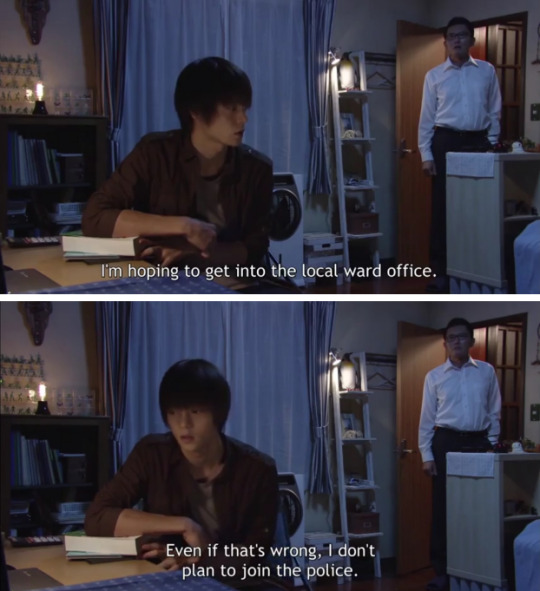
[photo 1: light's bedroom, where there are so many decorations and personal items it makes the room look very busy. there's a large window along the wall behind soichiro and light. the lighting tints everything almost a blue color behind light, who is sitting at his desk, head turned a bit to soichiro. soichiro is in the doorway, staring at light's back. light is saying, "I'm hoping to get into the local ward office." photo 2: same setting, but now light is looking away from his father. he is saying, "Even if that's wrong, I don't plan to join the police."]
-- Episode 1
L: Does your son want to join the police? Soichiro: No. Light doesn’t have a good impression of my job.
-- Episode 2
Soichiro: When you were a child, you wanted to become a police officer, didn’t you? But when your mother died, you stopped saying you wanted to join the police. It was watching me that killed your desire to become a police officer, right?
-- Episode 6
furthermore, because he's blatantly depressed, he wants nothing more than to enter the public service and gain some sense of stability in his life
Light [internally]: You can invest your life in something and it might make you money, but it won’t necessarily make you happy.
Light [internally]: As long as I can feed myself and spend my days in peace and stability, that’s all I need.
-- Episode 1
most importantly, when sachiko died, soichiro refused any of the responsibilities of a mother. he was very emotionally closed off and distant, choosing instead to throw himself even farther into his job and leave his children alone in their grief.
Soichiro: You wanted me to realize you were suffering alone. That’s what you tried to tell me, wasn’t it? If I had noticed your cries for help earlier... Your lies... Your suffering... If only I had noticed then.
-- Episode 10
instead, light is the one forced to become the “mother” of the family, so to speak, taking on both the emotional responsibilities of managing both his and his sister’s grief and raising her, as well as the associated household tasks--feeding them, cooking for them, working to put food on the table, fretting about bills, and so on.
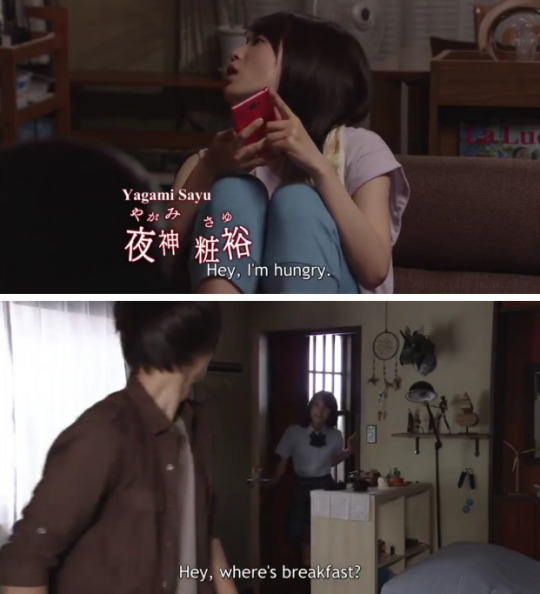
[photo 1: sayu yagami, now a teenager presumably in high school. her hair is just past her shoulders. she is wearing a pastel purple top and cropped light blue skinny jeans. she sits on the living room couch with her knees to her chest, smart phone dangling in her hands as she turns her head, calling to light: "Hey, I'm hungry." photo 2: light's bedroom. light is jumping up from his desk in surprise, turning to face sayu, who has entered his bedroom without warning. she is wearing her school uniform. she's asking, "Hey, where's breakfast?"]
-- Episode 1
he's very maternal having to practically raise sayu from a very young age and it results in a very caring, gentle man. on top of his depression, disillusionment with soichiro’s job, and lower social class, he never has the opportunity to be a genius like manga light because he’s busy taking care of his family--he’s more occupied with seeking stability than getting ahead and playing a genius, even if he’s smart enough that he could have, in another life.
Kamoda: You’ve always beaten me on grades. You could aim a bit higher if you worked at it. Light: No thanks. No thanks.
-- Episode 1
to be clear, all of these are huge red flags for drama light suffering from parentification--specifically, instrumental parentification. i’m sure you all read the introductory quote, but here is some information on the phenomenon:
Parentification is the process of role reversal whereby a child is obliged to act as parent to their own parent or sibling. Instrumental parentification involves the child completing physical tasks for the family, such as looking after a sick relative, paying bills, or providing assistance to younger siblings that would normally be provided by a parent.
The almost inevitable byproduct of parentification is losing one's own childhood. In destructive parentification, the child in question takes on excessive responsibility in the family, without their caretaking being acknowledged and supported by others: by adopting the role of parental care-giver, the child loses their real place in the family unit and is left lonely and unsure. In extreme instances, there may be what has been called a kind of disembodiment, a narcissistic wound that threatens one's basic self-identity.
All results of parentification are negative. There are no positive byproducts; the 'maturity' and 'emotional resilience' are directly linked to their underlying anxiety and displacement in the family dynamic.
we see light acting as a parent to sayu--cooking, cleaning, working, practically raising sayu on his own while soichiro is practically out of the picture. he receives no praise for this from either his sister or his father, who take it for granted or complain to him when he doesn’t. and as many children who are forced to do so, light is left depressed, devoid of aspirations, and displaced.
the name of this meta and the graphic used to represent it is maslow’s hierarchy of needs. if you’re unfamiliar, there’s a good explanation of it at verywellmind (which i cannot link), and i bring it up because drama light and manga light fall into very different categories. manga light has made it all the way through esteem, and is currently working on his self-actualization throughout the story of Death Note:
"It may be loosely described as the full use and exploitation of talents, capabilities, potentialities, etc. Such people seem to be fulfilling themselves and to be doing the best that they are capable of doing... They are people who have developed or are developing to the full stature of which they capable."
Self-actualizing people are self-aware, concerned with personal growth, less concerned with the opinions of others, and interested in fulfilling their potential.
drama light, on the other hand, has barely even broached his social needs. his place on the pyramid is “love and belonging”--he has love, from his friend kamoda, and from sayu, even if she doesn’t appreciate him--but his relationship with his father is strained and his mother is gone, and his parentification has left him feeling out of place.
it’s these relationships, though, that are the core of why he begins using the death note to begin with.
immediately before light gets the note, he’s working and talking with his wealthier friend kamoda, who was targeted throughout their lives by a delinquent named sakota who extorted money from kamoda through physical violence. we’re shown a younger light in high school watching this violence, incapable of helping his friend. sakota is released from prison in the first episode and immediately finds light and kamoda again, extorting money from kamoda at knifepoint.
kamoda responds like this:

[photo 1: light, as an adult, standing outside. it's night, the lighting is dim. he is scowling at sakota, who is out of view. light's internal thoughts are split between these two images. the first reads "I wish guys like him--" and the second reads, "--would just go away forever."
photo 2: light's close friend kamoda, curling in on himself in fear. his fingers are laced together and he's holding his arms to his chest, cowering. he looks afraid. he is wearing a long sleeve blue shirt and an orange backpack.]
-- Episode 1
it’s moments after this, when light is walking home, that he finds the note. he writes sakota’s name not because he’s bored, like his manga counterpart; he does it because he internalizes kamoda’s words and because both he and his best friend were threatened at knifepoint by him. even then, drama light has second thoughts, attempting to erase and then scratch out the name.
when it works, light is utterly horrified, overhearing about sakota’s heart attack while eavesdropping on his wake. he nearly has a panic attack until, once again, he hears how people respond:

[ photo 1: a public setting, in front of a funeral home. sakota's funeral has just finished. it is still daylight out. two young men in black suits have come out from the funeral home and are walking down the sidewalk. one of them asks, "Sakota did nothing but make trouble for people when he was alive, right?" light is hiding behind shrubs and a tree on the other side of the sidewalk, crouching and covering his mouth. photo 2: a close up screenshot of a hand holding a smart phone. it appears to be viewing a group chat of some kind, and multiple people are messaging it and talking about sakota's death in japanese. there are several messages that contain "WWWW" which is the japanese equivalent for "lol". one of the young men from the previous picture is saying, "Deep down, they're all relieved he's dead."]
-- Episode 1
at this point, though, light is still horrified. he wants to believe it’s fake, so he throws the note in the trash and attempts to dump it. unlike manga light, who feels the need to test it and dismiss any lingering doubts that he may have unintentionally murdered a man, drama light would rather put it out of his mind entirely.
obviously, sakota is very different from manga light’s first murder, and that’s because in the tv drama the first two murders are switched. sakota, who has a heart attack on his motorcycle, is intended to be the man manga light killed at the convenience store for sexually harassing a woman. the second murder in the tv drama is otoharada kuro, the man holding an elementary school hostage, and in this adaptation he also has a personal connection to the family: the case that soichiro was on when sachiko died was otoharada’s original arrest.
in the tv drama, otoharada takes an elementary schooler and her mother hostage in order to exchange her for soichiro himself, who he blames for his original arrest. light hears about this from matsuda, and for the third time, his sister responds like this:

[photo: a large room with several wide windows streaming light into it through white blinds. there are three rows of long desks, two chairs at each, similar to a classroom. police officers and detectives are buzzing around; some are going through files and paperwork frantically. sayu and light are in the far back on a bench against the wall. light is sitting, hands folded in his lap, as he watches his sister. sayu is standing, wearing her school uniform of a blouse, tie, and plaid skirt. she is shouting, "Just kill that scum and save my dad already!"]
-- Episode 1
light returns home and uses the note for the second time in order to save his father, who light still respects and craves the approval and emotional support of even despite their distance.
at the point of his second murder, manga light has a breakdown before almost immediately compartmentalizes his guilt and doubling down on the idea that he can do no wrong because he's been told he can't his entire life. for the first week until ryuk arrives he begins killing people in earnest, whereas drama light is deeply and profoundly horrified.

[ photo 1: a mid-chest and upwards shot of light. he is in his bedroom, looking down at the floor. he is wearing an open plaid shirt over a tee shirt. the subtitles for his internal thoughts say, "I would have been happy...just letting the days pass by uneventfully..." photo 2: a close up shot of light's face. he is wide-eyed, dragging his left hand down his cheek and staring at his right. in horror, he is saying, "I killed them."]
-- Episode 1
he ultimately ends up fleeing to a rooftop in the city and attempting to throw himself off of it before being talked out of it by ryuk. ryuk tells him that he can take the note back and erase light’s memories of it--which light nearly accepts--before mentioning that if light didn't want it, he'd give it to someone else, potentially a criminal who could do terrible things with it.
Ryuk: What if a real bastard like those guys you killed, Otoharada or Sakota, picked up that notebook? Light: No! Ryuk: The person who picks up the Death Note gets to decide how they use it.
-- Episode 1
so light takes the note.
what happens after this has been summed up by tumblr user whoresband in their post about drama light (which i can’t link due to tumblr not letting this post appear in the search but i’ll link the relevant portions and you can look it up):
when he gets the death note, he gains a power that was unavailable to him as a child. it was initially his sense of responsibility to his family and his caring nature that drove him to use it, but it was that promise of power that made him keep using it. as the series progresses, light begins to change. he tells sayu to cook for herself, to wash her own clothes. he demands a seat with his father, and sayu pours him a beer just like she did for their father. he stops being kind to misa and begins to use her as a tool for his plans. he manipulates women in his path, consistently viewing them as tools and neglecting their humanity. the death note has given him access to manhood and the freedom that it provides that he was denied by taking on the role of his mother. the death note teaches him that masculinity holds power, and he gladly takes hold of it.
i’m not going to reinvent the wheel and just restate what this person has said, because it’s spot on, but i will provide examples--
he tells sayu to cook for herself...
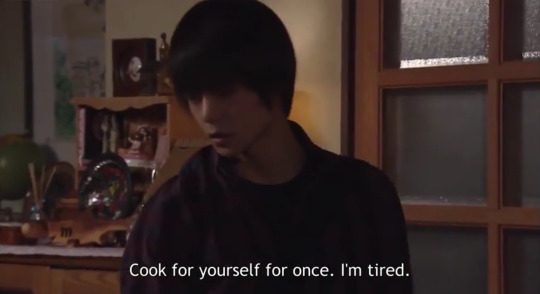
[photo: light is in the yagami household, but it's difficult to say which room. the lighting is dim and it's difficult to see much of his outfit or eyes. he is saying to sayu, "Cook for yourself for once. I'm tired."]
-- Episode 1

[photo: light, sayu, and soichiro are all in their dining room. it is very busy-looking; it's full of furniture which is lined with knick knacks and thriving green potted plants. soichiro is wearing his work clothes, including a white dress shirt, and he's sitting at the table watching his children. sayu is standing between soichiro and light, with her hands on the chair next to the table. we cannot see her face, as it is turned to light, who is in the doorway. he is wearing a sort sleeved button up, unbuttoned, with a tee shirt and jeans. we can see the strap of a shoulder bag across his chest. light is saying to sayu, "Cook for yourself, for once."]
-- Episode 2
..to wash her own clothes.
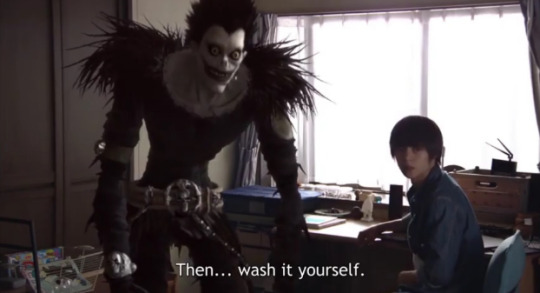
[photo 1: light and ryuk in light's bedroom, both facing sayu, who is offscreen. light is sitting at his desk, looking anxious. the shinigami ryuk is looking over him, wearing a sinister grin and wearing all black. light is saying to sayu, "Then... wash it yourself."]
-- Episode 1
...he demands a seat with his father...
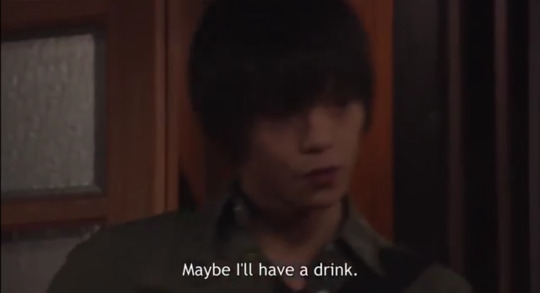
[ photo: a blurry screenshot of light from the shoulders up. he is saying, "Maybe I'll have a drink."]
-- Episode 2
...and sayu pours him a beer just like she did for their father.
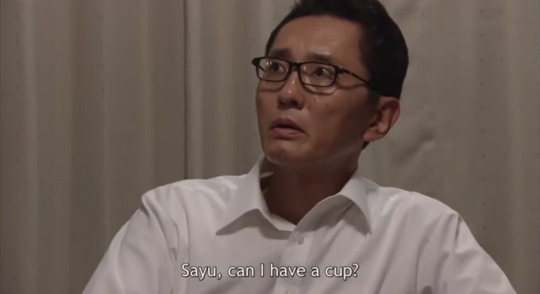
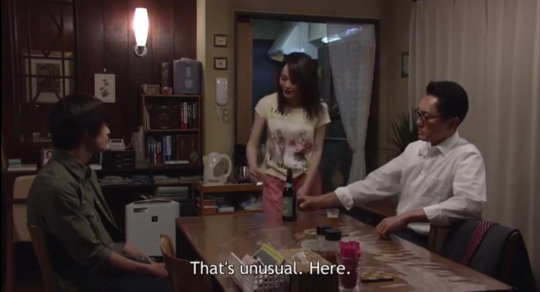
[photo 1: a shot of soichiro from the mid-chest up. he is wearing his white work shirt and rectangular, black glasses. he looks surprised, mouth slightly agape. he is looking at light and sayu, offscreen. light is saying, "Sayu, can I have a cup?" photo 2: the yagami family in their dining room. soichiro is sitting at the table on the viewer's right in his work shirt. one of his hands is reaching for a beer, and his other arm is resting on the chair beside him. light sits across from him on the viewer's left. sayu stands between them. she is saying, "That's unusual. Here."]
-- Episode 2
he stops being kind to misa and begins to use her as a tool for his plans
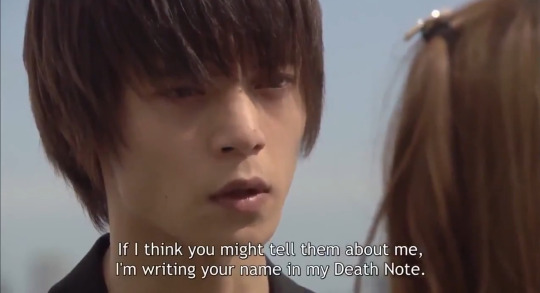
[photo: a closeup of light's face. he looks very serious, speaking to misa. we can only see the back of her head. light is telling her, "If I think you might tell them about me, I'm writing your name in my Death Note."]
-- Episode 4
he manipulates women in his path, consistently viewing them as tools and neglecting their humanity.
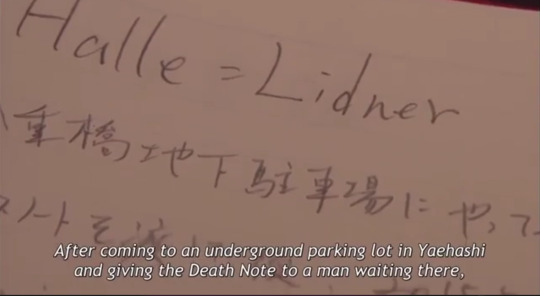
photo 1: a very close screenshot of Light's handwriting in the death note. in english, he's written, "Halle Lidner". below her name is some japanese handwriting. Light reads, “After coming to an underground parking lot in Yaehashi and giving the Death Note to a man waiting there,”]
-- Episode 10
but this isn’t the only option light yagami is offered. you may have noticed i went this entire post without mentioning the other major player in the tv drama: L.
a large part of what drives light to ambition isn’t just receiving the note and gaining power, especially when his memories are gone and he lacks that foundation; it’s his rivalry--and then, briefly, friendship--with L. L drives him to do better, both when he’s on the opposite team and when they’re on the same one.
unfortunately, this post is getting long and in order to do the next part justice, i need to flesh out drama L and his motivations a bit more, so i’ll be posting him as a standalone post in the coming days. it’ll cover his character development in the tv drama and how he affects light in turn up until the end.
if you liked this analysis i highly recommend checking it out HERE! thanks for reading!
171 notes
·
View notes
Text
mankai company: cyberpunk
I never asked for this. But that’s just how ideas work, ain't it? One minute you’re mindlessly going through the daily grind, and the next moment it hits ya like a sucker punch to the gut. Then your mind’s racing, and you think: Why not? Whaddaya have to lose? You’ve rambled your way through semi-coherent flashes of inspiration before. Why should this one be different?
Note: everyone is aged up, oh, let’s say at least five years. Also, long post is long. I’m not joking. The page break is there for a reason.

Mankai Company is a modest-sized corporation specialising in biotechnology and cybernetics. But operating beneath its public face is a semi-covert band of mercs, private eyes, and fixers called Kaga Solutions, fully-equipped to navigate the mean city streets on command. Their founder and CEO, Yukio Tachibana, has recently disappeared; as per his express wishes, the company leadership is transferred to his estranged daughter, Izumi.

Izumi Tachibana: the new CEO, more experienced in programming than in biotech, she wants to lead Mankai in a new direction focused on augmented reality and fluid human-machine interfacing, while also investigating her father's disappearance with its covert Kaga operatives.
Isuke Matsukawa: Yukio's—and now Izumi's—personal assistant who also handles most of the day-to-day finances, a seemingly bumbling man with hidden talents. He has more connections than you'd expect, and his loyalty is bone-deep.
Yuzo Kashima: a major shareholder in the company whose investments helped Yukio jump-start his dream into reality. Initially skeptical of Izumi's direction, he slowly grows to believe in her vision, even if he's still brutally honest about many things. He's aware of Kaga and the hidden side of Mankai, and is implied to have once partaken in it more personally.
Tetsuro Iwai: the local hardware genius. If you need something built, he'll figure out how to do it in record time. He's happy to work with the old boss' daughter, even if her ideas can stretch him to his limits sometimes.
Ken Sakoda: nobody's really sure what his official job is. He's just always there, usually appearing out of nowhere to do whatever Sakyo asks him to (there's rumours of a personalised cloaking device). This ranges from coffee runs to, ah, semi-legal inventory procurement.
Kamekichi: a robot parrot Yukio personally built as a pet project. Originally a prototype for robotic therapy animals, his code gave birth to his own emergent sassy personality.

Sakuya Sakuma: head of Engineering, what he lacks in experience he makes up in talent and dedication. Has politely declined playing a more active role in Kaga's assignments, declaring his current job to already be his dream job anyhow.
Masumi Usui: a tech prodigy, a quick learner who's always keen to impress Izumi for reasons which may not be strictly professional. Built his own memory implants from scratch, and is always willing to help with Kaga if ever asked.
Tsuzuru Minagi: the top dog when it comes to programming and software. Tends to overwork himself, especially at crunch time, but he writes top-notch code that leave Mankai's competitors scratching their heads. Also helps oversee and plan Kaga's missions, especially when it comes to concocting cover stories and identities.
Itaru Chigasaki: yet another punch-clock worker whose only skills lie in testing and bugfixing… or so he'd have you believe. In reality, he's one of Kaga's most reliable operatives, using his salaryman persona to relieve suspicion and gain people's trust. By the time his targets notice the "GG EZ" hacked onto every screen, it's too late.
Citron: another Kaga operative, people see him and think he's the expat office worker who struggles to string a coherent sentence together, so they don't always pay attention to what they say around him. Big mistake. If he can't evade you in conversation, then he'll evade you the traditional way and vanish seemingly into thin air.
Chikage Utsuki: formerly Itaru's senior at their old job, who followed him to Mankai for reasons of his own. He does minor coding for them now, but his primary focus is on being a field agent for Kaga, where his charm and covert investigative skills really come into play.

Tenma Sumeragi: a former child actor, now the company's face, appearing in advertisements and endorsements. He's great at both presenting Mankai's personable, human-interest agenda and selling Kaga's sharp professionalism to potential clients.
Yuki Rurikawa: hired fresh out of university, his sharp sense of aesthetics led Izumi to trust him with practically all of their product design. Every concept has to have his seal of approval before moving to the production stage. He also handles disguises for Kaga's operations.
Muku Sakisaka: formerly slated to compete in the Olympics before an accident, he now provides another public face for Mankai alongside Tenma. He writes a good deal of the company's promotional material, and has a strong sense of what would affect their clients.
Misumi Ikaruga: officially, he tests the more physical cybernetics, such as Sakuya's impact-dampeners or Tasuku's mountain-climbing legs; his videos performing literally superhuman parkour feats often end up as promotional material. Under the table, he's Kaga's go-to operative for situations requiring speed and agility.
Kazunari Miyoshi: head of the PR department, in charge of keeping their public image in the positive while also keeping Kaga’s activities mostly out of attention. He keeps everyone in the loop with current affairs, often feeding intel to his old friend Tsuzuru for planning.
Kumon Hyodo: baseball's new rising star, he started doing sponsorship and endorsement deals after Muku and Juza introduced him to Izumi. He's enthusiastic about working with them and often helps coming up with ideas for reaching into the sports demographic.

Banri Settsu: a bio-augmentation enthusiast and grey hat hacker, he once breached Mankai's firewalls basically out of boredom; when Izumi tracked him down, she decided to offer him a job in her cybersecurity division, and he agreed. Of course, as soon as he hears about Kaga, he all but jumps into it headlong.
Juza Hyodo: wanted to be a cop as a kid; that was before the city's corrupt police force disenchanted him of the idea. His cousin Muku convinced him to work for Mankai, so he thought he'd give the corporate samurai gig a chance. His earnest dedication quickly wins him a spot on Kaga, as do his excellent combat skills.
Taichi Nanao: initially a mole from Godza, sent to tear Kaga apart from within, he went turncoat within months and is now their primary source on Godza's methods and internal affairs. He balances quick and dirty combat tactics with his boyish charm and knack at appearing harmless.
Omi Fushimi: former military, honourably discharged after a terrorist attack took out his best friend and left him heavily injured. Now he works for Mankai as head of security, with a bit of unofficial HR thrown in there. Unlike the rest of Akigumi, he isn't part of Kaga, as he believes his focus should be on keeping the company safe and secure.
Sakyo Furuichi: head of Kaga, and its oldest member still on active duty. These days he mostly sticks to mission control, but occasionally lends support on the field if he deems it necessary. His sharp mind and eye for patterns makes him particularly good at planning missions, exit strategies, and backup plans.
Azami Izumida: the son of a yakuza boss who decided to leave the family business behind to strike out on his own, he still keeps a number of his old underworld contacts. Officially an intern, he's also eager to get into fieldwork with Kaga, putting his years of swordsmanship lessons to use.

Tsumugi Tsukioka: head of biotech, his research on how cranial implants can be used to treat sleep disorders turned him—and Mankai—into a household name. He infrequently lends a hand to Kaga by developing and fine-tuning their cybernetics.
Tasuku Takato: a former member of Godza, he quit his job to work for Mankai instead, and is now a valued member of their biotech team. He specialises in developing prosthetics for their more athletic clients, and like Tsumugi, focuses on his R&D most of the time.
Hisoka Mikage: formerly working for a similar fixer/PMC group, a near-fatal neuro-implant malfunction caused him to forget everything that happened since its installation. As Mankai found him, removed the bad implant, and nursed him back to health, he thought it's just apt to repay the debt by working for them. One of Kaga's most well-rounded operatives, he is strongest in stealth and wetwork.
Homare Arisugawa: an eccentric professor to his core; his studies range from urban to agrarian, sprawling across fields and topics, but his passion project lies in developing ocular implants that can read micro-expressions on the fly, allowing its owner to identify and record people's emotional reactions easily.
Azuma Yukishiro: the face of the biotech divison, he works closely with Mankai's clients to help them find the perfect cybernetics for their personal needs. He also often gleans information and gossip from his endless well of unsuspecting acquaintances and old contacts, passing them on to Kaga for their missions.
Guy: a friend of Citron's from his homeland; extensively cybernetically augmented after a major accident years ago, he claims to be more machine than human by this point. Ostensibly Homare's research assistant, he is a field agent for Kaga, equally skilled in hacking as he is in hand-to-hand combat.
#a3!#a3! au#mankai x kaga#that's what imma call it#not gonna tag everyone bc hoo boy#a3! act! addict! actors!#it started from an icon#then a header#then a whole bloody au#also#in which azami is kinda genji shimada#hisoka owes inspiration from morgan yu#guy and omi bears the adam jensen legacy#and homare's backstory has a random mordin solus reference#don't mind me explaining my own jokes lol#ari's stuff
31 notes
·
View notes
Text
Crime in New York City Plunges to a Level Not Seen Since the 1950s
Police recruits being sworn in at Madison Square Garden in October. Crime in New York City has declined for 27 straight years, even as police officers use less deadly force and make fewer arrests. CreditTimothy A. Clary/Agence France-Presse — Getty Images
It would have seemed unbelievable in 1990, when there were 2,245 killings in New York City, but as of Wednesday there have been just 286 in the city this year — the lowest since reliable records have been kept.
In fact, crime has fallen in New York City in each of the major felony categories — murder and manslaughter, rape, assault, robbery, burglary, grand larceny, and car thefts — to a total of 94,806 as of Sunday, well below the previous record low of 101,716 set last year.
If the trend holds just a few more days, this year’s homicide total will be under the city’s previous low of 333 in 2014, and crime will have declined for 27 straight years, to levels that police officials have said are the lowest since the 1950s. The numbers, when taken together, portray a city of 8.5 million people growing safer even as the police, under Mayor Bill de Blasio, use less deadly force, make fewer arrests and scale back controversial practices like stopping and frisking thousands of people on the streets.
“There is no denying that the arc is truly exceptional in the unbroken streak of declining crime,” said William J. Bratton, who retired from his second stint as police commissioner last year.
But officials see one area of concern: an uptick in reports of rapes toward the end of the year. The increase, which officials said included a higher-than-normal number of attacks that occurred more than one year ago, coincided with the publication of accusations against powerful men like Harvey Weinstein, which gave rise to the #MeToo movement encouraging victims to come forward. City police officials have said they believed news coverage played a role in the spike in reports, though they also credited their own efforts combating domestic violence with encouraging victims to speak up.
Continue reading the main story
RECENT COMMENTS
George Warren Steele
8 minutes ago
Next time, bury a report like this. Otherwise, Trump will take credit for it.
Spencer
10 minutes ago
Not to be that guy, but crime trends are incredibly complex and most of these comments are suggesting that there are a select few obvious...
Ricardo de la O
22 minutes ago
There are three kinds of lies: lies, damn lies, and statistics. I am happy that numbers are down, I've been in and out of NYC since the...
SEE ALL COMMENTS
WRITE A COMMENT
ADVERTISEMENT
Continue reading the main story
And while rapes were down from last year by one, to 1,417, misdemeanor sex crimes — a catchall for various types of misconduct that includes groping — ticked up 9.3 percent to 3,585 so far.
The lower homicide numbers are still preliminary — and include one announced on Wednesday night — but they jibe with large drops in killings in major cities like Chicago and Detroit, while contrasting with sizable increases in killings in smaller cities like Charlotte and Baltimore.
The city today is a far cry from what it was when Mr. Bratton arrived in 1990 to become the head of the then-separate Transit Police. Not only were there 2,245 killings that year, but there were more than 527,000 major felony crimes and more than 5,000 people shot. Shootings have plunged to 774 so far this year, well below last year’s record low of 998. And for the first time, fewer than 1,000 people have been hurt by gunfire: 917 as of Sunday.
The continued declines are a boon to Mr. de Blasio, a Democrat elected on promises of police reform — promises that prompted warnings of mayhem to come by his opponents in 2013. But the opposite has happened, putting him on stronger footing as he pivots to a second term with a Police Department transformed to exercise greater restraint as it focuses on building trust in the city’s neighborhoods.
Franklin E. Zimring, a professor at University of California, Berkeley, School of Law, said the downturn was an “astounding achievement,” but it raised another question: How long and low will crime fall?
“We don’t know when we’ve exhausted the possibilities of urban crime decline, and we won’t know unless and until New York scrapes bottom,” said Mr. Zimring, who analyzed the first 20 years of New York’s historic crime reduction and expounded on it in a book.
Mr. de Blasio and the police commissioner, James P. O’Neill, credit recent drops in crime to the Police Department’s emphasis on going after the relatively small groups of people — mostly gangs and repeat offenders — believed to be responsible for most crime, while also building relationships in communities where trust has been strained.
Mr. Bratton applauded political support for the police from the mayor, who provided funding for investments in officer hiring, training, equipment and overdose-reversal drugs.
One of the results is that police officers are using deadly force less often. As of Dec. 20, police officers intentionally fired their service guns in 23 encounters, a record low, down from 37 in 2016. The Police Department said officers were relying more on stun guns, which were used 491 times through November, compared with 474 times during the same period in 2016. More than 15,000 officers have been trained how to use them.
But criminologists differ about the cause of the continued declines. Mr. Zimring said that while better policing accounted for much of the decline in crime since 1990, it was no longer a primary driver. New York is “tiptoeing” toward a 90 percent crime decline for reasons that remain “utterly mysterious,” he said.
More broadly, research suggests that crime trends are closely tied to economic conditions. Interest rates, inflation and unemployment are among the macro-level factors influencing crime, according to James Austin, the president of the JFA Institute, a criminal justice policy nonprofit.
“What the Fed does will have more of an impact than any sentencing or police reforms,” Mr. Austin said.
The reductions in New York are a part of what the Brennan Center for Justice expects will be a 2.7-percent decline in crime rates and 5.6-percent drop in murder rates across the country’s largest cities. After record-high bloodshed last year, killings in Chicago have declined 15 percent.
Through August, rape was down in New York City 7 percent compared with last year, but a small increase in September was followed by spikes in October and November. The New York Times first published accusations against Mr. Weinstein on Oct. 5.
Reports of rapes that had occurred in a previous year, meanwhile, were up almost 12 percent through November. In response, the Police Department is adding investigators to its Special Victims Unit and has modernized the techniques detectives use to investigate claims.
“We can’t answer definitively” what is driving the rise, Commissioner O’Neill told reporters at a crime briefing this month. “At least I can’t. But we’re seeing people coming forward and having faith in the N.Y.P.D. And that’s what we want to happen.”
Whatever the reason for New York’s crime reductions, the statistics do not capture the complete picture of public safety. Some crimes are not represented fully or at all: acts of domestic violence, sexual assaults, identity thefts, hate crimes, and shootings that don’t result in injuries or damage.
In some cases, the data annotates horrible crimes: an ISIS-inspired truck rampage on a Manhattan bike lane on Halloween that left eight people dead; the ambush killing of a police officer, Miosotis Familia, 48, who was shot in the head on July 4 while sitting in her R.V.-style command post in the Bronx; the death of Timothy Caughman, 66, a black man, at the hands of a sword-wielding white supremacist on March 20.
Increasingly, officers are receiving calls to help people in emotional crises. The police responded to 157,000 such calls in 2016. But only 7,000 officers have received crisis intervention training for handling those situations.
While most police encounters are resolved without officers resorting to deadly force, fatal police shootings of people in emotional distress — including Dwayne Jeune on July 31 in Brooklyn and Miguel Richards on Sept. 6 in the Bronx — have drawn scrutiny. A police sergeant, Hugh Barry, was indicted on murder charges in May for the fatal on-duty shooting of a mentally ill woman, Deborah Danner, in October 2016. His trial is scheduled to begin in January.
December 27, 2017 at 07:20PM http://ift.tt/2Cf8SdK
0 notes
Text
Why Resilience Is Good for Your Health and Career
By Laura Landro, WSJ, Feb. 15, 2016
Resilience is often defined as the capacity to adjust to change, disruption or difficulty and move on from negative or traumatic experiences in a positive way.
Studies find people with the most resilience tend to be more productive, less likely to have high health-care costs and less often absent from work. Now, some employers are offering programs to help employees become more resilient. They are providing webinars and group coaching to teach skills and habits that help people stay focused and functioning during stressful times at work or home.
Many such programs in use in the military, police forces and school systems are related to a movement called Positive Psychology, which focuses on increasing positive emotions, putting negative emotions in perspective and learning to thrive despite challenges.
Royal Dutch Shell says a resilience-training program it started five years ago and has offered to employees in over 50 countries “seems capable of enabling a sustained change that extends beyond improved resilience into broader human performance.” The company points to data showing positive effects persist up to four years.
A recent review of more than a decade of studies, led by researchers at the University of Nebraska and published in the Journal of Occupational and Organizational Psychology, found resilience training in the workplace can help improve employees’ mental health and subjective well-being, and offer wider benefits in social functioning and performance.
While some people have natural coping skills, “we know that resilience can be developed , and you can give people the resources to build within them the power to bounce back from adversity,” says Fred Luthans, management professor emeritus at the University of Nebraska who is co-author of ���Psychological Capital and Beyond,” a book about applying positive psychology science at work, and who is developing webinars on resilience training.
James Avey, an assistant professor of management at Central Washington University whose research includes work with sales professionals experiencing anxiety and depression as a result of high customer rejection rates, says coaching is most helpful for people who are initially low in resilience. “Even making this person normal or average on resilience can have an extremely high life impact,” he says.
HealthPartners, a Minneapolis nonprofit with seven hospitals, 55 primary-care clinics, 1,700 doctors, 22,500 employees and a health plan serving 1.4 million medical and dental members, offered emotional resilience group coaching to 2,200 headquarters employees in 2013 and 2014, including emotional-resilience training for about 2,000 managers. Other programs for some staffers include online virtual coaching on topics such as positive thinking, stress management and healthy sleep.
In a study published in the January/February issue of the American College of Sports Medicine’s Health & Fitness Journal, researchers at HealthPartners reported that among a group of employees who participated in three one-hour emotional-resilience sessions, well-being persisted at least one year later.
Karen Lloyd, co-author of the study and senior director of behavioral health and resilience at HealthPartners, says results were measured using an online health assessment that includes questions about lifestyle, such as diet and exercise, and quality-of-life measures, such as how often participants missed work due to illness; results are summarized with a 1000-point score. The average score for certain lifestyle factors improved by 10 points among coaching participants compared with no significant improvement for a group that didn’t participate; life and job satisfaction scores improved as well.
Traci Kubisiak, a solutions consultant in HealthPartners’ health-plan business, says she was intrigued by a flyer for one of the coaching sessions, “Bringing Your Best Self to Work.” In addition to work and mothering two daughters, ages 7 and 9, Ms. Kubisiak is a caregiver for her ill father and says her life often felt like “frenzy.” One day, while sitting in a meeting while her phone flashed that her father’s nurse was calling, she realized, “I needed the whole concept of resilience.”
The three-session program included lessons in building the habit of being fully present in the moment, putting some play time into each day and cultivating an “attitude of gratitude,” including writing down three things she was most grateful for, even mundane things like getting a good parking spot. She learned to develop rituals to separate home from work, such as taking off her ID and putting her parking permit away. “Life isn’t going to get less stressful,” she says. Coaching led her to think about “how can we bend without breaking, so we don’t snap in two.”
Resilience coaching teaches skills that help people adjust in a positive way to change or difficulty while continuing to function at home and work. Some tips, from HealthPartners:
Break the negative self-talk habit. Many people create stress, anger or sadness with negative phrases they say to themselves as often as 60 times a day. Watch out for these thoughts and replace them with statements of fact. Instead of “I am so stupid,” think “I made a mistake, but I can correct it.”
Find a sanctuary. To restore a sense of calm and positive energy, move to a quiet location for just 5 minutes, or imagine yourself in a pleasant scene.
Smile, listen, ask questions. You can influence the reactions of co-workers, which will boost your mood and productivity. Work on having a pleasant facial expression, a warm tone of voice and relaxed posture. Ask questions; listen to the answers.
Take a walk with a co-worker. Research shows people who have a friend at work are more satisfied with their jobs and are higher performers. Even if you have just a half-hour in a week, relationship building is a solid investment of time and energy.
Choose gratitude. Write down three things you are thankful for every day. No one has a perfect life but everyone has some things to be grateful for. Focusing on them sets a positive tone for the day.
0 notes